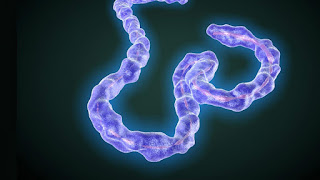Researchers discovered chemical compound that stops Ebola virus replication:
Researchers
discovered chemical compound that stops Ebola virus replication:
Viruses
are small ailment-inflicting agents (pathogens) that replicate inside the cells of living
organisms. A group of viruses known as
non-segmented, negative
sense (NNS) ribonucleic acid (RNA) viruses purpose commonplace ailments
which includes rabies, mumps and measles. Those pathogens causes more critical
lethal illnesses, inclusive of Ebola, Hendra and Nipah. Currently, there are
not any authorized and powerful remedies in opposition to those viruses, which,
in step with statistics from the the Centres for Disease Control and Prevention,
are associated with mortality rates up to 90 percent following infection. The largest outbreak on record
for the filovirus family was caused by Ebola virus in West Africa between 2013
and 2016, resulting in more than 28,000 infections and more than 11,000 deaths.
In this study, the researchers screened a library of 2
hundred,000 small molecule compounds to discover potential inhibitors of Ebola
virus RNA synthesis. They identified fifty six hits that inhibited Ebola
virus activity more than 70 percent, while showing less than a 20 percent
chance of being toxic to cells. They found three chemical systems with potent
antiviral activity against Ebola virus in cellular culture. A new chemical
class of compounds that successfully blocked genetically numerous viruses from
replicating via limiting RNA production by means of the virus in cellular
tradition. These indoline alkaloid-kind compounds inhibited a number of viruses
from replicating, such as Ebola. Human lung epithelial cells and human
embryonic kidney cells had been uncovered to numerous viruses, Ebola virus,
Marburg virus, vesicular stomatitis virus and Zika virus, and the antiviral
effects of the 3 chemical structures had been discovered.
Those compounds represent probes of a significant virus
characteristic and a potential drug goal for the improvement of effective
huge-spectrum antivirals for a variety of human pathogen. This type of chemical
systems, benzoquinoline, confirmed antiviral interest in opposition to Ebola
virus and become additionally lively in opposition to another lethal filovirus,
Marburg virus. Benzoquinoline was also effective against vesicular stomatitis
virus from the rhabdovirus family, that could infect bugs, farm animals, horses
and pigs, and Zika virus, that's spread to humans by mosquitoes.
For more details go through the link : https://bacteriology.infectiousconferences.com/



Thanks For Sharing this information with us
ReplyDeleteBest Infectious Disease Doctor in Mumbai